Nigeria, often referred to as the “Giant of Africa,” is a country that boasts a remarkable blend of diverse cultures and traditions. These traditions are not only deeply rooted in the hearts of its people but are also expressed through the universal language of music and cultural festivals.
Nigeria’s diversity shines as it is home to various ethnic groups, each with its unique customs and musical styles. These differences make Nigeria a cultural treasure trove, and music festivals and cultural events are the stage where this treasure is showcased.
From the enchanting beats of traditional music to the modern rhythms of contemporary music festivals, Nigeria’s cultural events are an embodiment of its past and a celebration of its present. They offer not only entertainment but also a glimpse into the rich history and promising future of this remarkable nation.
In this article, we will embark on a journey through Nigeria’s colorful and harmonious cultural tapestry, where music festivals and cultural events take center stage.
Diversity of Nigerian Music and Culture
Nigeria is home to over 250 ethnic groups, each with its unique languages, traditions, and music. From the Yoruba people in the southwest to the Igbo in the southeast and the Hausa-Fulani in the north, the country’s musical tapestry is as diverse as its people. Each of these groups brings forth its distinct musical traditions, creating a symphony of sounds that resonates throughout the nation.
The Yoruba people, for instance, are known for their vibrant drumming and dancing traditions. The talking drums, known as “dundun,” play a crucial role in Yoruba music. These drums “speak” by mimicking the tones and patterns of the Yoruba language. In Yoruba festivals like the Eyo Festival in Lagos, traditional drumming and dance are showcased with exuberance, providing a window into the heart of Yoruba culture.
In the southeast, the Igbo people have their unique musical styles, often characterized by percussion instruments like the “udu” and “ogene.” Igbo music is deeply tied to their customs and rituals, enriching these ceremonies with melodies that resonate with the soul.
The north of Nigeria is home to the Hausa-Fulani people, whose music is punctuated by the enchanting sounds of the “talking drum” and the “kora.” The Durbar Festival, a grandiose event that celebrates the end of Ramadan, features resplendent displays of Hausa-Fulani music, showcasing their cultural opulence.
Nigeria’s musical diversity extends beyond its indigenous sounds to incorporate the influences of colonialism and global music trends. Highlife music, which combines traditional West African rhythms with Western instruments, has thrived in Nigeria. In contrast, contemporary genres like Afrobeats, a fusion of Afrobeat and various international styles, have catapulted Nigerian artists to international acclaim. Acts like Wizkid, Burna Boy, and Davido are global ambassadors for this dynamic fusion of sounds.
Some Nigerian Music Festivals
Felabration
One of the most iconic music festivals in Nigeria is Felabration, an annual event conceived in 1998 by Yeni Anikulapo-Kuti to honor the legendary Fela Kuti. Fela Kuti, renowned for pioneering the afrobeat genre of music and his contributions as a human rights activist, left an indelible mark on Nigerian culture. Felabration, held annually at the New Afrika Shrine in Ikeja, offers a week-long celebration that attracts visitors from around the world. The Lagos State Government even recognizes it as an official tourist destination.
Felabration is carefully timed to coincide with Fela Kuti’s birthday and boasts a dynamic lineup of musical performances, featuring both Nigerian and international acts. Street parades, symposia on social issues, debates, and photo exhibitions add depth to the festival. Notable performances from artists like Third World, 2face, Femi Kuti, Ice Prince, and even a surprise appearance by Majek Fashek have made Felabration a cherished and revered event on the Nigerian cultural calendar.
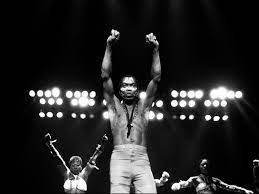
Lagos International Jazz Festival
The Lagos International Jazz Festival (LIJF), or Lagos Jazz Fest, is a three-day celebration of jazz music and culture in Nigeria. Founded by Ayoola Shadare of Inspiro Productions, the festival provides a platform for jazz enthusiasts to revel in the melodious tunes in different settings. The 2016 edition, for instance, included a two-day standard edition at Freedom Park, Lagos, and a one-day luxury edition at The Bay Lounge Waterfront. These venues encapsulate the versatility of the jazz genre, where it can be enjoyed in both relaxed and sophisticated settings.
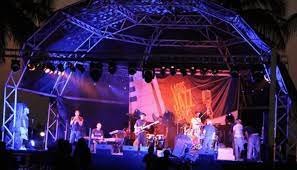
Rhythm Unplugged
Rhythm Unplugged stands as a testament to the power of music to unite West Africa. Organized by Flytime Promotions, a subsidiary of the Flytime Group, the concert has been a consistent annual event in Nigeria since its inception in 2004. Featuring a lineup of top artists, Rhythm Unplugged has hosted stars like Wizkid, Olamide, Davido, Tiwa Savage, and Seyi Shay, drawing a massive following of music enthusiasts.
The concert’s innovative format, dialogue-driven co-hosting, and a wide array of talented performers have made it a hallmark of Nigerian music events. It’s a testament to the industry’s growth and recognition on the international music scene.
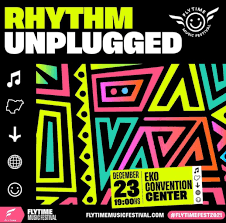
Star Mega Jam
The Star Mega Jam stands as a testimony to Nigeria’s love for music and entertainment. This series of music concerts was an annual tradition that graced the stages of Lagos and Abuja from 2000 to 2010. The line-up for this musical extravaganza featured international sensations like Awilo Logomba, Shaggy, Usher, Koffi Olumide, 50 Cent, Ja Rule, Kevin Lyttle, LL Cool J, Akon, Kanye West, T-Pain, Nelly, Nas, Busta Rhymes, and Ludacris.
The festival was a highlight on the calendars of music enthusiasts, promising unforgettable nights filled with rhythm and melody. However, the music journey came to a halt in 2011, with organizers citing logistical challenges. While it may have concluded, the Star Mega Jam remains etched in the memories of those who had the privilege of witnessing its glory.
Gidi Culture Festival
Imagine a music festival that brings together the vibrant tapestry of African culture, live bands, DJs, and an array of musical talents from Nigeria, Ghana, South Africa, Congo, Kenya, and the United Kingdom. Welcome to the Gidi Culture Festival, often referred to as “Coachella in Lagos.” Co-founded by Chinedu Okeke and Oriteme Banigo, this annual one-day extravaganza answers the call for accessible, affordable, and electrifying entertainment in Africa.
The Gidi Culture Festival isn’t just about music; it’s a celebration of art and creativity. Beyond the captivating sounds, attendees can engage with outdoor activities, local vendors, and artisans, all contributing to a holistic cultural experience. The festival’s mission is clear: to nurture African talent and elevate artists within the continent, fostering their growth in overseas markets. It’s a platform that harmonizes creativity and showcases Africa’s musical brilliance.
Livespot X Festival
In 2019, the Livespot X Festival burst onto the Nigerian music scene, captivating audiences with its dynamic energy and star-studded line-ups. Organized by Livespot 360, owned by Deola Art Alade, this annual music concert became a sensation from the moment it was launched. Lagos and Accra were the fortunate cities to host the festival’s maiden edition.
The Livespot X Festival creates a mesmerizing fusion of live performances, music, spectacular lighting, special acts, and immersive experiences, all seamlessly woven into a high-octane event. The 2019 edition showcased an array of remarkable artists, including Cardi B, Teni, Burna Boy, Tiwa Savage, Seyi Shay, Joeboy, Ice Prince, DJ Cuppy, Reekado Banks, and Patoranking.
This festival is a testament to Nigeria’s unwavering passion for music and live entertainment. It’s not just an event; it’s an immersive journey that celebrates the heartbeat of Nigerian music.
Some Nigerian Cultural Events
Nupe Cultural Day
On the 26th of June, Nigeria celebrates Nupe Cultural Day, a traditional and cultural event that commemorates a significant historical event. This celebration marks the day when the British Army faced defeat at the hands of a native African Army in 1896, near the Bida Military camp in Ogidi. This momentous victory resulted in the capture of the Union Jack by the Nupe Cavalry. Unlike other traditional events in Nigeria, such as the Durbar festival and Pategi Ragatta boating festival, Nupe Cultural Day stands as a unique and significant celebration of tradition, culture, and a pivotal moment in history.
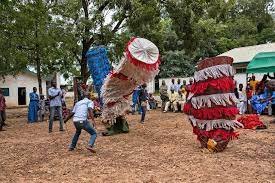
Calabar Carnival
Held in Calabar since 2006, the Calabar Carnival is a spectacular display of band competitions, parades, mouthwatering cuisine, and infectious dancing. Known as Nigeria’s most extensive street party, the carnival draws thousands of costumed participants and millions of spectators, even being televised across the country. This celebration is the culmination of the month-long Calabar festival, and its elaborate preparation includes months of rehearsal by participating teams. It’s a dazzling display of creativity and a testament to Nigeria’s vibrant spirit.
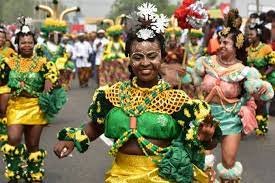
Nibo Carnival
Nibo Carnival, previously held during the Easter season, has recently transitioned to December, facilitating greater participation by Nibo citizens worldwide. The carnival includes a vibrant street parade, “Tales by Moonlight” symposium that delves into the rich history of the Igbo people, and the grand Ada Nibo beauty pageant competition. The event commemorates the person with the strongest juju or voodoo power, uniting Nibo communities and fostering cultural ties.
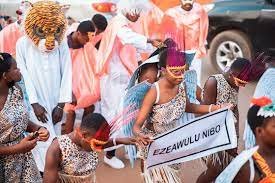
Igbo New Yam Festival
The Igbo New Yam Festival, also known as Iri ji or Ike ji, is an annual cultural celebration that takes place at the end of the rainy season in early August. It’s a time of thanksgiving for the bountiful yam harvest. The festival features ceremonial rites, cultural dances, and masquerade performances accompanied by traditional musical instruments like ekwe, ogene, bells, maracas, and wooden flutes. The festival’s importance lies in honoring the significance of yam in Igbo culture.
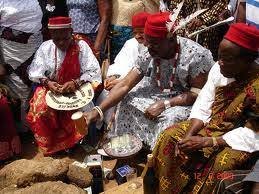
Igogo Festival
The Igogo Festival held in Ondo State spans seventeen days, and its highlight is when the Olowo of Owo and high chiefs dress as women to pay homage to Queen Oronsen, a mythical protector. This unique event emphasizes the power of protection and highlights the deep-rooted traditions of the Owo Kingdom.
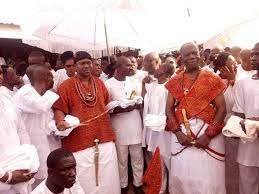
Nnewi Afiaolu Festival
Nnewi Afiaolu, known as the New Yam Festival, is celebrated in Nnewi, Anambra State, usually around August. The festival commences with the “Iwaji,” where yams are scaled, followed by an array of festivities that include cultural dances and masquerade performances.
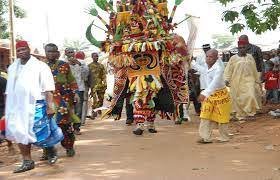
Omabe Festival
The Omabe Festival, celebrated every five years, is a treasure to the Imufu community in NSUKKA region, Ezike, Enugu State. It stands as an omen of purification, cleansing the community from evil. The festival features various masquerades, including Eshiwe, Obele Monwu, and Mukwu Monwu. A unique highlight is the fearless competition, where contenders attempt to untie a ram tied to a pole against all odds. The victor becomes a local legend, commemorated for their strength and bravery.
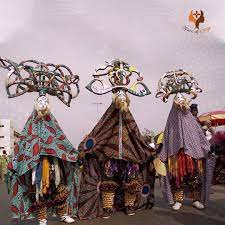
Afan National Festival
Every 1st of January, the town of Kagoro in the southern part of Kaduna State, Nigeria, comes alive with the Afan National Festival. With cultural displays by troops from the town, its surroundings, and across the Middle Belt, this event is a testament to the enduring spirit of Nigerian traditions. The festival, active for over four centuries, is a celebration of the bravery and gallantry of a legendary hunter named Katagwan, renowned for his exceptional hunting skills and exploits.
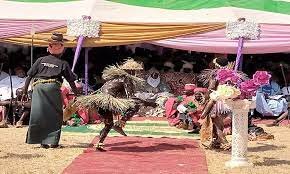
Argungu Fishing Festival
In the northwestern Nigerian state of Kebbi, the Argungu Fishing Festival marks the end of age-old hostilities between the Sokoto Caliphate and the Kebbi Kingdom. This four-day annual festival, which began in 1934, takes place on the Sokoto River between February and March. Here, thousands of fishermen armed only with nets compete to catch the largest fish. The festival is more than just a fishing competition; it includes dance, music, sporting events, and displays of arts and crafts, attracting visitors from around the world. The festival’s roots trace back to the historic peace visit of the 16th Sultan of Sokoto, Alhaji Hassan Dan Mu’azu, which rendered the Argungu waters fertile, leading to the yearly commemoration of this momentous occasion.
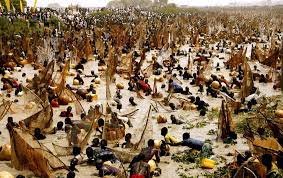
Ikeji Arondizuogu
The Ikeji cultural festival of Arondizuogu in Imo State stands as one of the most significant pan-Igbo cultural celebrations, steeped in history and tradition. With origins spanning over five centuries, this grand festival gathers Igbo-speaking communities from around the world. A spectacle of colorful masquerades, including Ogionu, Mgbadike, Nwaaburuja, and Ozoebune, parades through the market square, captivating onlookers. The festival celebrates the harvest of the first yams, fostering unity among Aro people, scattered across Igbo-speaking states and parts of Cross River. It’s a cultural extravaganza that unites both the Igbo community at home and in the diaspora.
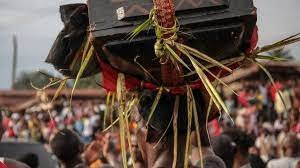
Benefits of Music Festivals and Cultural Events in Nigeria
1. Attracting a Multitude of Attendees
Music festivals and cultural events in Nigeria draw in a diverse audience, ranging from locals to international tourists. These events become vibrant hubs of activity, increasing footfall in the host cities and regions.
2. Boosting Local Businesses
Local vendors, hotels, and restaurants experience a surge in business during these festivals. Visitors and attendees often seek accommodations, meals, and souvenirs, injecting a considerable amount of revenue into these establishments.
3. Generating Employment
Music festivals and cultural events create a wealth of job opportunities. Local musicians, artists, event planners, and support staff are in high demand, helping to alleviate unemployment and contribute to the livelihoods of many.
4. Revenue Generation
These events are not just a cultural spectacle but also a significant revenue generator. Ticket sales, food and beverage sales, and merchandise purchases collectively contribute to economic growth.
5. Showcasing Local Entrepreneurship
Music festivals and cultural events provide a platform for local entrepreneurs to showcase their products and services. These talented individuals have the opportunity to display their crafts, artwork, and culinary delights, gaining exposure and attracting potential customers.
6. Fostering Business Opportunities
The exposure gained by local entrepreneurs can lead to increased sales and new business opportunities. Collaborations and partnerships can emerge, further enhancing economic growth in the region.
Conclusion
Nigerian music festivals and cultural events stand as a testament to the nation’s enduring traditions, offering a harmonious blend of old and new. These events are not merely celebrations; they are bridges to the past, guides to the future, and a testament to the resilience of Nigeria’s cultural heritage. As they continue to thrive, they bring people together, foster unity, and ensure that Nigeria’s diverse and vibrant culture endures for generations to come.
